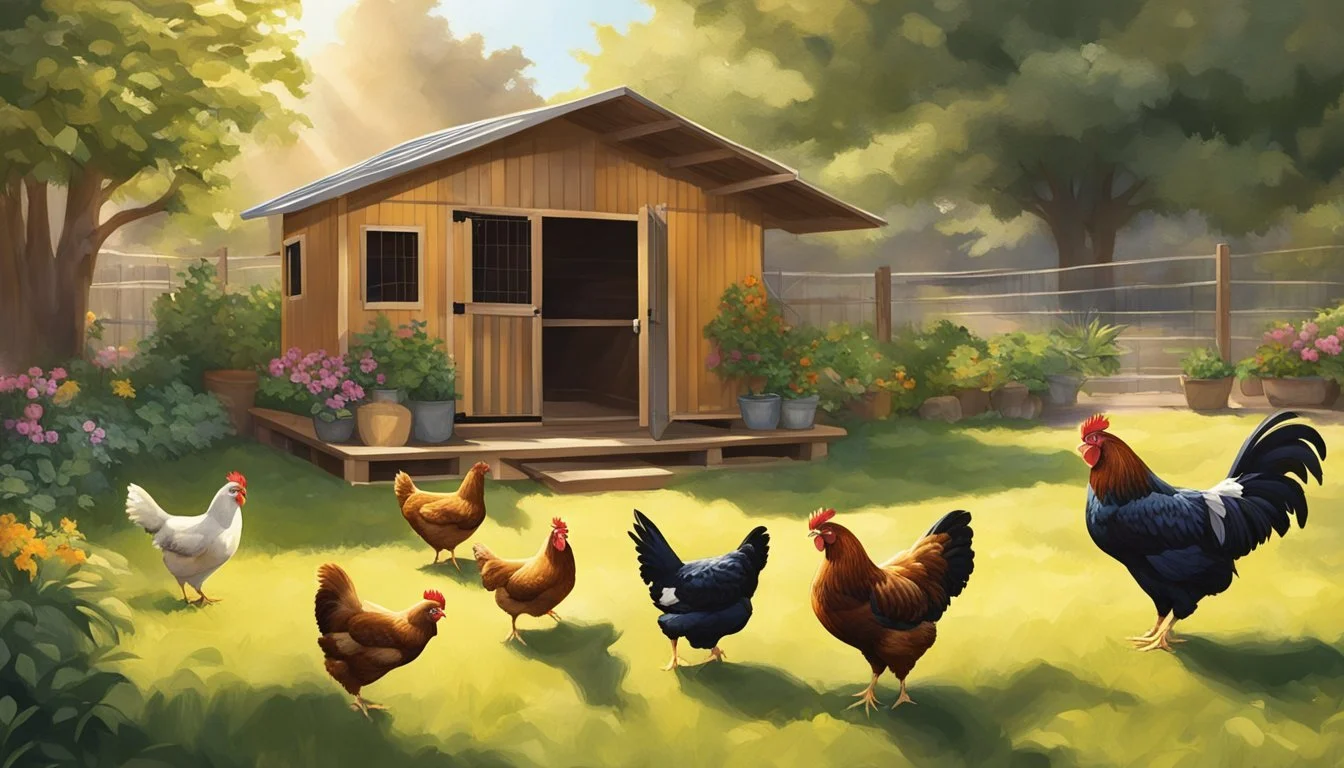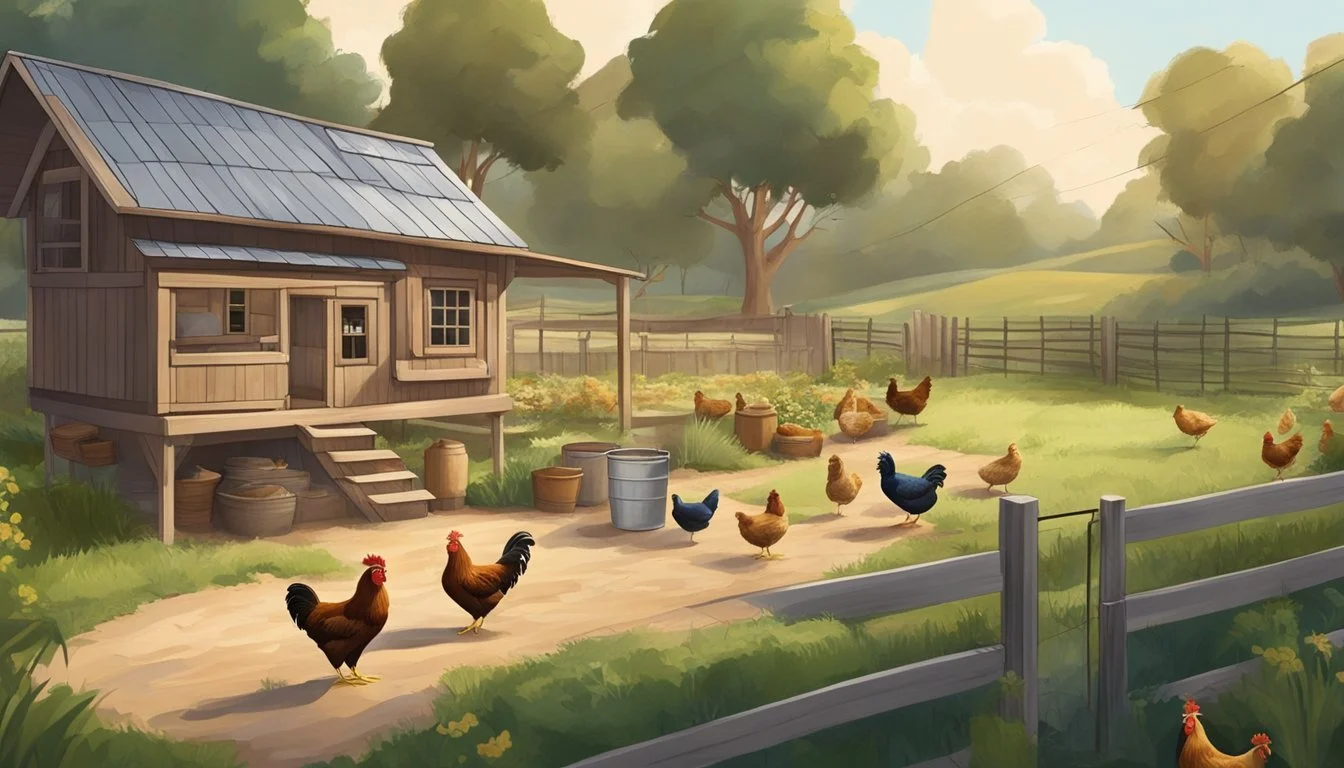Raising Backyard Chickens in Citrus Heights, CA
A Comprehensive Guide
In the city of Citrus Heights, California, raising backyard chickens has been subject to regulations that ensure harmony within residential communities. As increasing numbers of residents show interest in sustainable living and local food production, keeping hens for egg production has become a desirable activity. It is important for prospective and current chicken owners to be well-informed about local regulations to maintain compliance and avoid penalties.
The Citrus Heights community has taken steps to update the local ordinances in response to numerous requests regarding the keeping of backyard hens. These updates aim to balance the interests of those wishing to raise chickens with the concerns of neighboring residents. Those interested in pursuing this endeavor must conduct thorough research to understand the specific requirements set forth by the city, such as property size limitations and the number of hens allowed.
With the rise in popularity of urban agriculture, raising chickens in a backyard setting presents a unique opportunity for Citrus Heights residents to engage in food production at a personal level. However, responsible chicken ownership involves more than knowing the law; it includes understanding best practices in chicken care, coop construction, and management to ensure the health and well-being of the birds. As such, individuals must be well-prepared to undertake the research and commitment required to successfully raise backyard chickens in this community.
Understanding Local Laws and Regulations
For residents of Citrus Heights, CA, it is essential to be aware of local chicken laws and municipal ordinances regarding the keeping of backyard chickens. These rules vary depending on zoning and lot size, and adherence is necessary for legal and community harmony.
Citrus Heights Chicken Ordinance
In Citrus Heights, one is allowed to keep hens but not roosters or other types of fowl such as ducks or geese. The local ordinance clearly states that a hen is defined as a female chicken 6 months or older and is primarily kept for egg production. Properties less than 10,000 square feet may have different restrictions, and it is critical to check with the Planning Division for precise regulations.
Permit and Zoning Requirements
The zoning regulations determine whether backyard chickens are permissible, with designations like RD-1 and RD-2 specifying the nature of residential zoning. Residents should consult with the Planning Division or Code Enforcement within the City of Citrus Heights to understand the relevant permit needs and restrictions based on the size of their property and zoning code.
Zoning Code Breakdown:
Urban Areas: May have more stringent requirements due to space limitations.
Rural Areas: Often allowed to keep more hens based on larger property sizes.
Local Government and Community Engagement
Local laws, including chicken ordinances, are subject to change, often influenced by community support and petition. The Citrus Heights City Council is instrumental in approving any revisions to local regulations. For city residents, attending council meetings and staying engaged with municipality activities can provide opportunities to participate in the discussions concerning backyard flocks and local farming practices.
Opportunities for Engagement:
City Council Meetings: A platform to voice opinions on chicken laws.
Petitioning: Residents can request revisions to existing regulations.
Community Involvement: Building support can lead to more favorable laws.
Selecting the Right Breed
When choosing chickens for a backyard flock in Citrus Heights, CA, residents should consider climate suitability and whether they're raising the birds for egg production, meat, or both. Relative hardiness and the bird’s purpose are pivotal in this choice.
Considerations for Climate
Citrus Heights, California experiences a Mediterranean climate with hot, dry summers and mild, wet winters. The selected breeds should be able to adapt to these conditions. Breeds such as the Rhode Island Red are known for their hardiness and can endure varying temperatures, making them suitable for this region. On the other hand, breeds like the Silkie, with their fluffy plumage, may require additional shade and water during intense heat.
Egg Production vs. Meat
The decision between breeds for egg production versus meat significantly impacts the type of chickens one should keep.
For egg production: Look for breeds like the Leghorn, which can provide a substantial quantity of fresh eggs, boasting an impressive output of up to 250-300 brown eggs per year. They are also a common presence at Purina retailers, where owners can source feed specifically designed for layers.
For meat production: The Cornish Cross is a prime choice, known for its rapid growth rate and substantial meat yield.
Some chickens serve a dual purpose and can provide both meat and eggs to their keepers. The Plymouth Rock is an exemplary dual-purpose bird, with a good temperament and suitable for backyard flocks.
In a backyard setting, hens are the egg layers while roosters are not necessary unless breeding is the objective. However, one should be aware of Citrus Heights' regulations on the keeping of roosters before making any decisions.
Designing and Building Your Coop
When designing and building a chicken coop in Citrus Heights, CA, residents must adhere to certain space standards, ensure protection against predators, and maintain a clean habitat with proper ventilation.
Space Requirements
Each chicken requires a minimum of 4 square feet of coop space and 10 square feet in a chicken run. The size of the coop should accommodate the entire flock with adequate space to prevent overcrowding. For instance:
Small flock (3-5 chickens): At least 12-20 square feet in the coop
Medium flock (6-10 chickens): 24-40 square feet in the coop
Protecting Against Predators
To predator-proof your chicken coop, focus on details such as:
Secure Latches: Use locks or carabiners on doors and access points.
Wire Mesh: Cover windows and vents with hardware cloth.
Solid Foundation: Bury the chicken wire at least 12 inches underground around the coop and run to deter digging predators.
Maintaining Cleanliness and Ventilation
Maintaining a clean coop with adequate ventilation is crucial to the health of backyard chickens. Include features like:
Nesting Boxes: One nesting box for every three hens, filled with clean, dry bedding to keep eggs clean.
Ventilation: Adequate number of vents or windows to ensure airflow, reducing moisture and ammonia levels.
Easy Cleaning: Design the coop with removable trays or access for regular cleaning to manage waste and prevent parasitic infestations.
Providing Proper Chicken Care
Optimal chicken care is essential for maintaining a healthy flock and ensuring the production of fresh eggs. Whether one maintains a flock of hens, roosters, or young chicks in Citrus Heights, CA, understanding the specifics of feeding and health management is critical.
Feeding and Nutrition
Proper feeding is crucial for the health and productivity of chickens. A balanced diet typically includes:
Grains: The mainstay of chicken nutrition, providing essential carbohydrates.
Proteins: Required for growth and egg production, commonly sourced from layer pellets or crumbles.
Vegetables and Fruits: Offered sparingly, they can be a source of vitamins and minerals.
Calcium: Necessary for eggshell strength, often provided through oyster shell supplements.
Fresh Water: Must be available at all times for hydration and metabolic processes.
Chickens also require access to grit, which aids in digestion. Monitoring the birds' consumption, adjusting feed based on their lifecycle stage, and preventing food from becoming wet or moldy helps maintain flock health.
Health Monitoring and Disease Prevention
Vigilant health monitoring and disease prevention are key to a thriving chicken environment:
Routine Checks: Regularly observing behavior and physical condition to identify signs of illness.
Cleanliness: Maintaining a clean coop to prevent parasites and respiratory issues is mandatory.
Vaccinations: Essential in preventing common diseases, and they should be administered as recommended.
Quarantine: Newly acquired or ill birds should be isolated to prevent the spread of disease.
Predator Protection: Secure housing is necessary to protect from local predators.
Up-to-date information on safe handling and disease management practices helps to shield both chickens and handlers from potential health hazards. Ensuring cooperation with local Citrus Heights regulations will also contribute to the overall well-being of the flock.
Managing Your Backyard Flock
In Citrus Heights, CA, raising a backyard flock requires attention to daily care and community harmony. Successful management of chickens ensures the health of the birds and maintains good relationships with neighbors.
Daily Routines
A flock's health and productivity depend on a consistent daily routine. Keepers should:
Feed chickens a balanced diet; lay mash for hens and starter feed for chicks.
Provide fresh water daily, cleaning containers to prevent algae and bacteria.
Check for eggs in nesting boxes, collecting them to keep hens laying regularly.
Inspect birds for signs of illness or distress.
Clean the coop regularly to manage waste and discourage pests.
One should ensure that coops and run areas are secure to protect the flock from predators.
Handling Neighbors and Noise
Maintaining a backyard flock harmoniously involves:
Communicating with neighbors, informing them about the chickens and addressing concerns proactively.
Limiting the number of roosters to reduce crowing, which can be a noise issue.
Strategically positioning the coop away from neighboring homes.
Before bringing chickens into one's backyard, it's important to review and adhere to Citrus Heights' municipal codes regarding backyard hens and noise control.
Ensuring Ethical Practices
Raising backyard chickens in Citrus Heights, CA requires adherence to ethical practices that focus on avoiding harm and promoting animal welfare and environmental sustainability. These practices ensure the health of the flock and the quality of the meat and eggs they produce, while also considering the impact on the local ecosystem.
Humane Treatment
Space Requirements: Adequate space for chickens is crucial. Each hen should have sufficient room to move, perch, and engage in natural behaviors. Overcrowding can lead to health issues and aggressive behaviors within the flock.
Healthcare: Regular health checks and prompt treatment of any illnesses or injuries are essential to prevent suffering and maintain the flock's overall health.
Proper Nutrition: Chickens require a balanced diet to support egg production and overall health. Clean water and appropriate feed must be provided consistently.
Predator Protection: Coops must be secure to protect hens from predators, a concern which is taken seriously in Citrus Heights.
Supporting Sustainability
Environmentally-Friendly Coop Design: The coop design should minimize waste and include features for easy cleaning to prevent odor build-up, meeting Citrus Heights’ regulations.
Garden Integration: Chickens can contribute to a sustainable garden ecosystem by providing natural pest control and producing manure that can be composted and used as fertilizer.
Egg Production: Ethical egg production includes allowing hens to lay eggs at a natural pace without artificial light manipulation typically used to maximize production.
Resource Management: Sustainable practices involve careful management of resources, including feed and water, to minimize waste and environmental impact.





